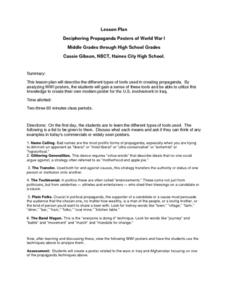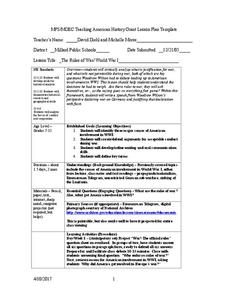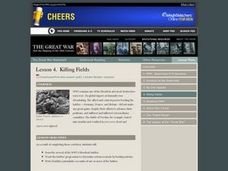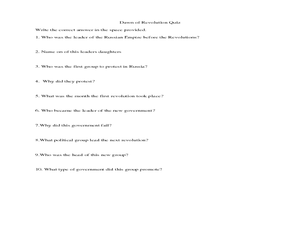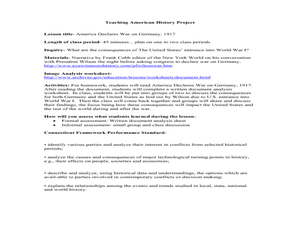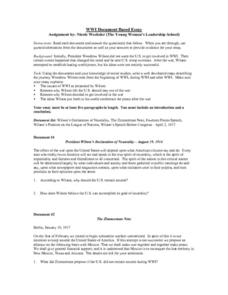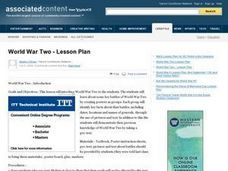National History Day
A Clever War: Scientific and Technological Advances in World War I
Technology—changing lives and transforming war. Your tech-loving historians examine photographs and primary documents to explore how technology changed not only World War I, but also how it moved society forward. They apply their...
Curated OER
Deciphering Propaganda Posters of World War I
What strategies are employed when creating propaganda? Your young historians will learn about six different techniques utilized in the construction of political propaganda, particularly in the advertisements of World War I. The...
Curated OER
World War I: War in a Democratic Society
Students research opposition and support for World War I from a number of perspectives. They analyze a number of primary and secondary sources, while considering what (if anything) makes a war just and write a letter expressing his/her...
Curated OER
The Rules of War/World War I
Young scholars explore the reasons the United States became involved in World War I. In this World History lesson, students research the reasons Woodrow Wilson made the decisions he did, prepare a debate and write a paper.
Curated OER
World War I
Eighth graders examine the condition of the world from 1880 until the start of World War I. After watching a PowerPoint presentation, they discuss the causes and effects of the war and complete a study guide with a partner. To end the...
Curated OER
World War I WebQuest
Young scholars reflect on the events before, during and after World War I. In this World History instructional activity, students complete a WebQuest that focuses specifically on the key events of World War I.
Curated OER
The Causes of Prohibition
Eleventh graders explore the origins of the Prohibition Movement in the United States. In small groups, they analyze the influence of World War I in the passage of the eighteenth amendment. Students explain how different demographics of...
Curated OER
Beginning of World War II
Ninth graders explore how the rise of dictators led to the start of World War II. They identify and explain the main causes for World War II and they explain the causes for the rise of dictators during the 1920's.
Curated OER
Lesson 3. No One Spared
Eleventh graders, in groups, explore the devastation that World War I inflicted on millions of people around the world. They write a first-hand account of the impact of World war I.
Curated OER
World War II: Causes and Consequences
Tenth graders examine Hitler's occupation of Europe and the Allies' efforts to fight it. For this World War II lesson, 10th graders examine how World War II changed American society, especially for women. Students analyze a...
Curated OER
Events and Effects of World War I
Ninth graders explore the main events, key people, outcomes and lasting effects of World War I. They research the lasting effects of World War I on the 20th Century and discuss the Treaty of Versailles and its effects on Germany.
Curated OER
Cold War Roots and Events
Ninth graders examine the causes and major events of the Cold War. They listen to a lecture and fill in the blanks on a handout, and in two groups develop a proposal to deal with the Cuban Missile Crisis.
Curated OER
Arkansas Civil War Bandits and Outlaws
Young historians study civilian Arkansas during the Civil War. They look at the many challenges they faced to keep their homes in order while the men were at war. Learners hear stories of bands of outlaws who ravaged the state during...
Curated OER
Social Changes in America Caused by World War II
Students research and examine the social changes that occured in the United States during World War II. In pairs they conduct research using a variety of resources, and organize and compose a "Guide to Life" for veterans returning home...
University of California
Decolonization
The ripple effect from one small event can impact many others. Young historians research the ripple effect World War II had on decolonization in the second installment of an eight-part series. Through primary and secondary documents as...
Curated OER
Perceptions of War
Tenth graders share perspectives on war with Iraq with students from various countries, and write position papers expressing specific stance on issues.
Curated OER
What is to Become of the World After the War?
Learners analyze primary sources regarding World War II. In this World War II lesson, students read "The Atlantic Charter," and respond to questions about the document.
Curated OER
Lesson 4. Killing Fields
Eleventh graders describe several of the WWI's bloodiest battles, track the battles' progression to determine advances made by leading nations, and write frontline journalistic accounts of one or more of the battles.
Curated OER
Russian Revolution Part 1
Ninth graders consider how the outcome of World War I contributed the Russian Revolution. In this Russian Revolution lesson, 9th graders watch the movie "Anastasia," and discuss the conditions that led to revolution in Russia.
Curated OER
America Declares War on Germany, 1917
Pupils explore the reasons that the United States entered World War I. In this World War I activity, students read "America Declares War on Germany, 1917," and then discuss the consequences for the U.S. entering the war.
Curated OER
My Secret War: Lesson 14
Fifth graders explore the civilian role during World War II. In this social studies lesson, 5th graders write an "I Am an American" poem from the perspective of various Americans during the war.
Curated OER
An Untold Triumph
Middle schoolers examine and analyze the history and experience of Filipinos in Hawaii and California. They identify the contributions of Filipino Americans to the US war effort in World War II, and analyze the many causes that led to...
Curated OER
WWI Document Based Essay
Young scholars read various primary source documents on World War I. After reading each document, they answer discussion questions. Using the internet, they identify the causes of World War I as layed out by President Wilson and his...
Curated OER
World War II
High schoolers create a Powerpoint presentation covering key information regarding a World War II battle and present the information to the class in the form of an oral presentation. They then will turn in a summary report including two...

